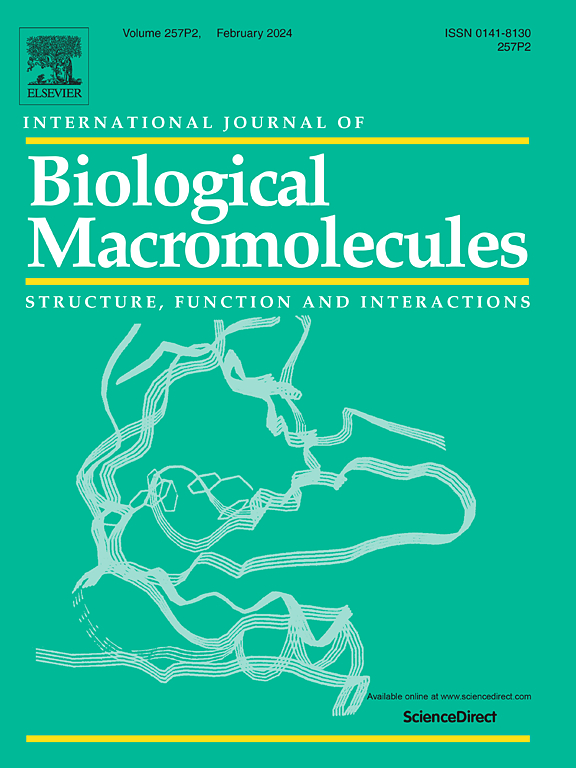壳聚糖纳米颗粒通过调节玉米幼苗多胺代谢和重建氧化还原稳态来减轻纳米塑料的毒性
IF 7.7
1区 化学
Q1 BIOCHEMISTRY & MOLECULAR BIOLOGY
International Journal of Biological Macromolecules
Pub Date : 2025-06-18
DOI:10.1016/j.ijbiomac.2025.145384
引用次数: 0
摘要
作为一种新兴的污染物,纳米塑料有可能对植物的生长和营养吸收产生负面影响,最终导致产量下降。壳聚糖纳米颗粒(csnp)是一种可持续高分子材料,已被证明可以提高对各种应激源的抵抗力。本研究旨在阐明CSNPs减轻聚苯乙烯纳米塑料(PSNPs)对玉米植株毒性的潜在机制。结果表明,CSNPs处理显著降低了玉米叶片和根组织中PSNPs的积累量,减少幅度为32.1% ~ 56.2% (P <;0.05)。此外,CSNPs可以减轻PSNPs诱导的植物毒性,叶绿素含量、叶面积指数和光合速率分别增加108.7%、29.4%和70.0%,最终导致植株总干重增加72%。此外,csnp系统上调多胺生物合成相关基因的表达,增加相关酶的活性,抑制多胺降解酶的活性,导致总多胺含量增加36.6%。此外,CSNPs通过调节抗氧化系统减少PSNPs应激引起的活性氧积累和脂质过氧化。总之,我们的研究结果表明,CSNPs通过调节多胺代谢和重建氧化还原稳态来减轻PSNPs对玉米植株的不利影响。本文章由计算机程序翻译,如有差异,请以英文原文为准。
Chitosan nanoparticles alleviate nanoplastics toxicity by modulating polyamine metabolism and re-establishing redox homeostasis in maize seedlings
As an emerging pollutant, nanoplastics have the potential to negatively affect plant growth and nutrient absorption, ultimately resulting in reduced yield. Chitosan nanoparticles (CSNPs), a sustainable polymeric material, has been shown to improve resistance to various stressors. This study aims to elucidate the potential mechanisms by which CSNPs may alleviate the toxicity of polystyrene nanoplastics (PSNPs) in maize plants. The results demonstrate that CSNPs treatment significantly reduced PSNPs accumulation in maize leaf and root tissues by 32.1 % to 56.2 % (P < 0.05) compared to PSNPs exposure alone. Furthermore, CSNPs alleviated PSNPs induced phytotoxicity, as evidenced by increases in chlorophyll content, leaf area index, and photosynthetic rate by 108.7 %, 29.4 %, and 70.0 %, respectively, ultimately leading to a 72 % increase in total plant dry weight. Additionally, CSNPs systematically upregulated the expression of genes involved in polyamine biosynthesis, increased the activities of related enzymes, and inhibited the activities of polyamine degradation enzymes, resulting in a 36.6 % increase in total polyamine content. Additionally, CSNPs decreased the accumulation of reactive oxygen species and lipid peroxidation caused by PSNPs stress by modulating the antioxidant system. Collectively, our findings indicate that CSNPs mitigated the adverse effects of PSNPs on maize plants by regulating polyamine metabolism and reestablishing redox homeostasis.
求助全文
通过发布文献求助,成功后即可免费获取论文全文。
去求助
来源期刊
CiteScore
13.70
自引率
9.80%
发文量
2728
审稿时长
64 days
期刊介绍:
The International Journal of Biological Macromolecules is a well-established international journal dedicated to research on the chemical and biological aspects of natural macromolecules. Focusing on proteins, macromolecular carbohydrates, glycoproteins, proteoglycans, lignins, biological poly-acids, and nucleic acids, the journal presents the latest findings in molecular structure, properties, biological activities, interactions, modifications, and functional properties. Papers must offer new and novel insights, encompassing related model systems, structural conformational studies, theoretical developments, and analytical techniques. Each paper is required to primarily focus on at least one named biological macromolecule, reflected in the title, abstract, and text.

 求助内容:
求助内容: 应助结果提醒方式:
应助结果提醒方式:


